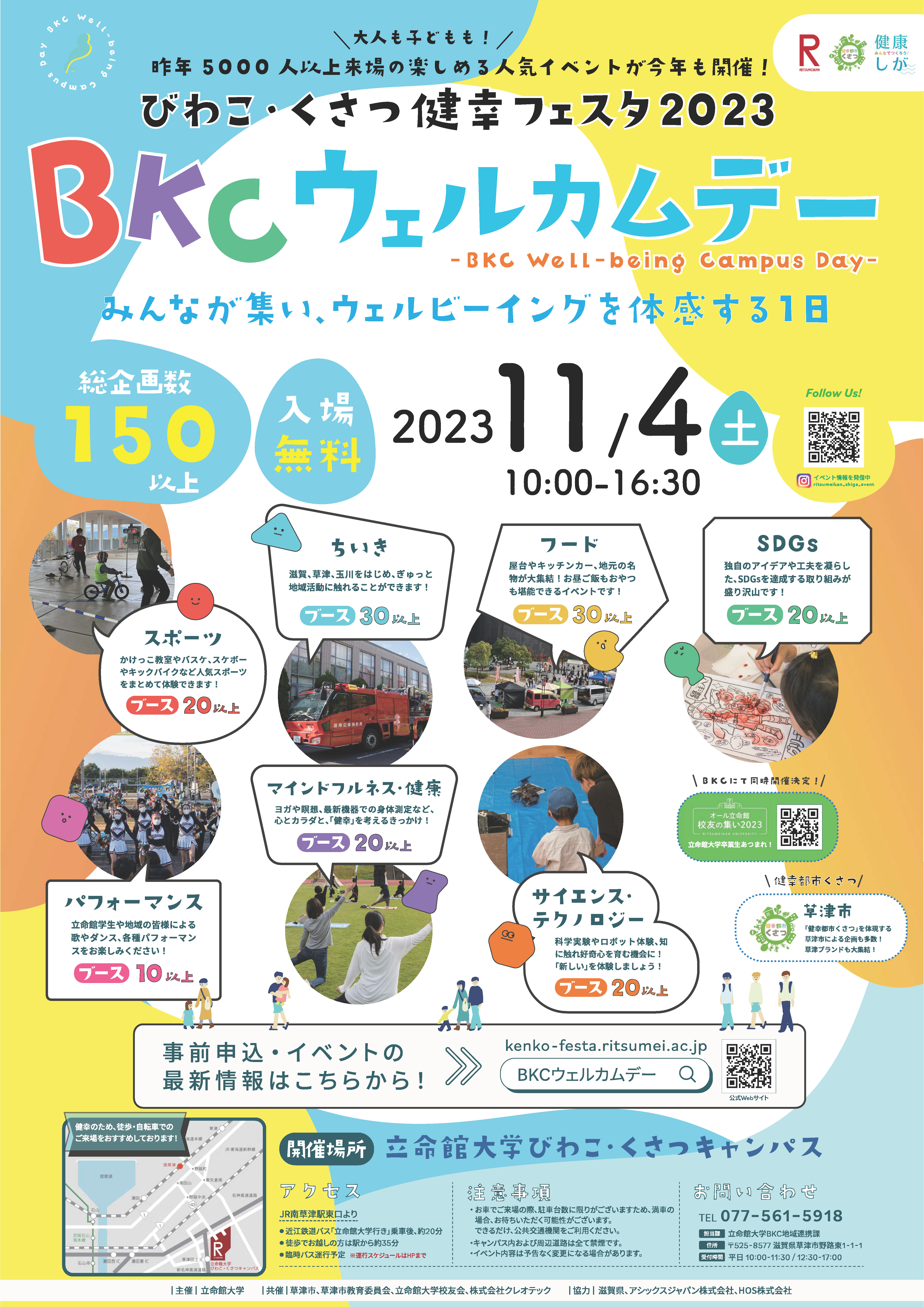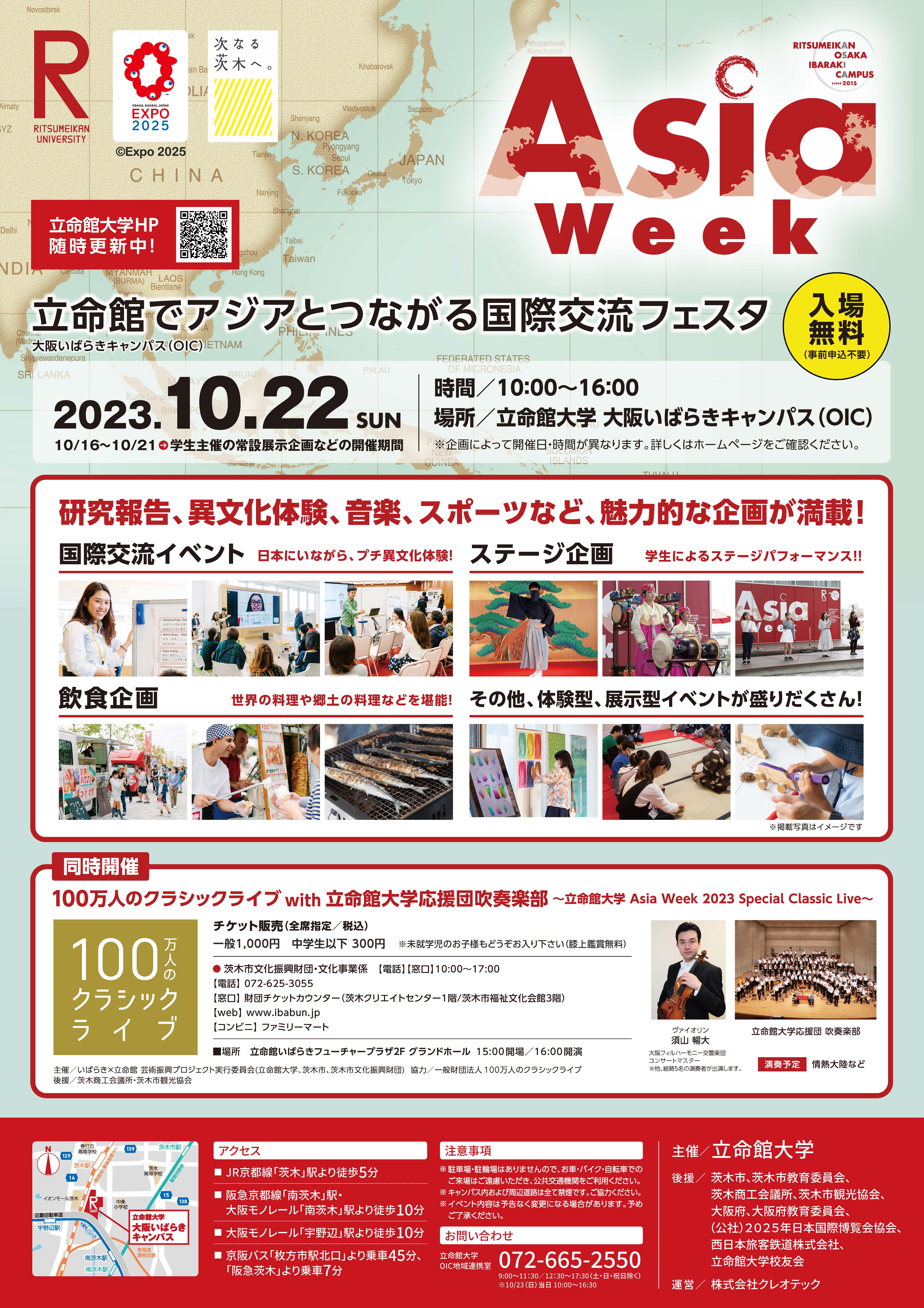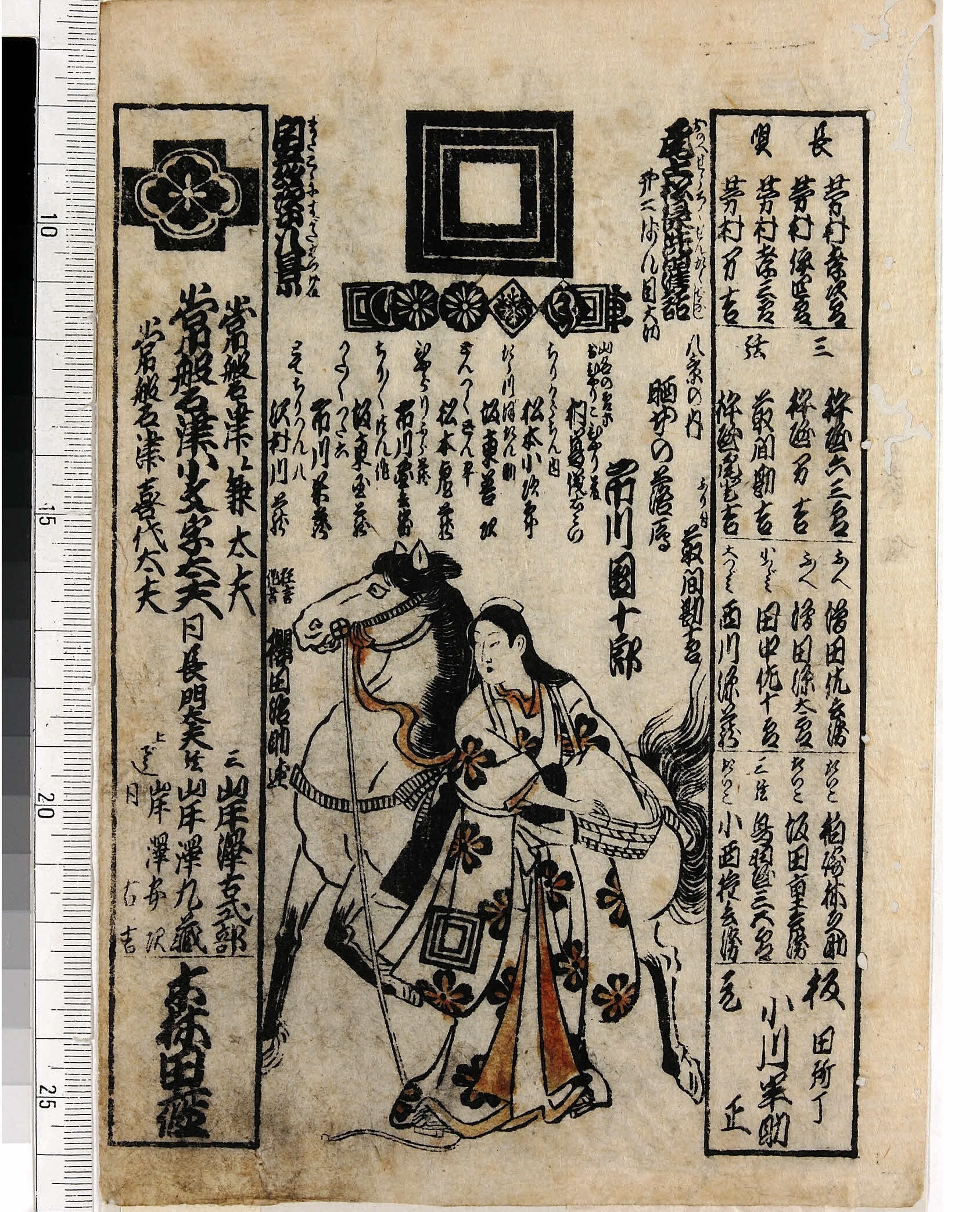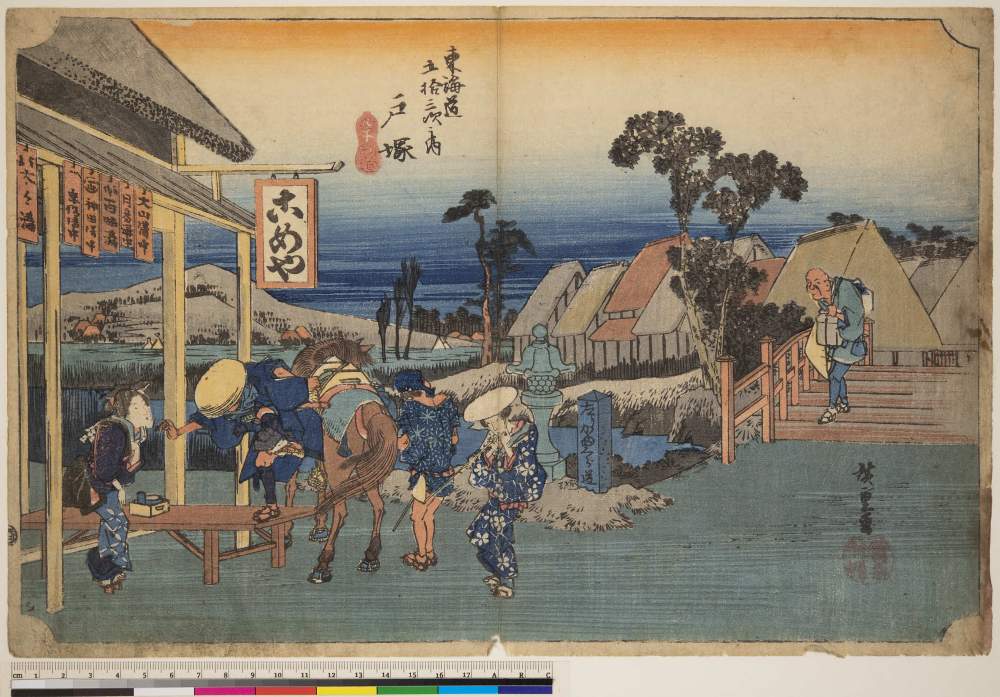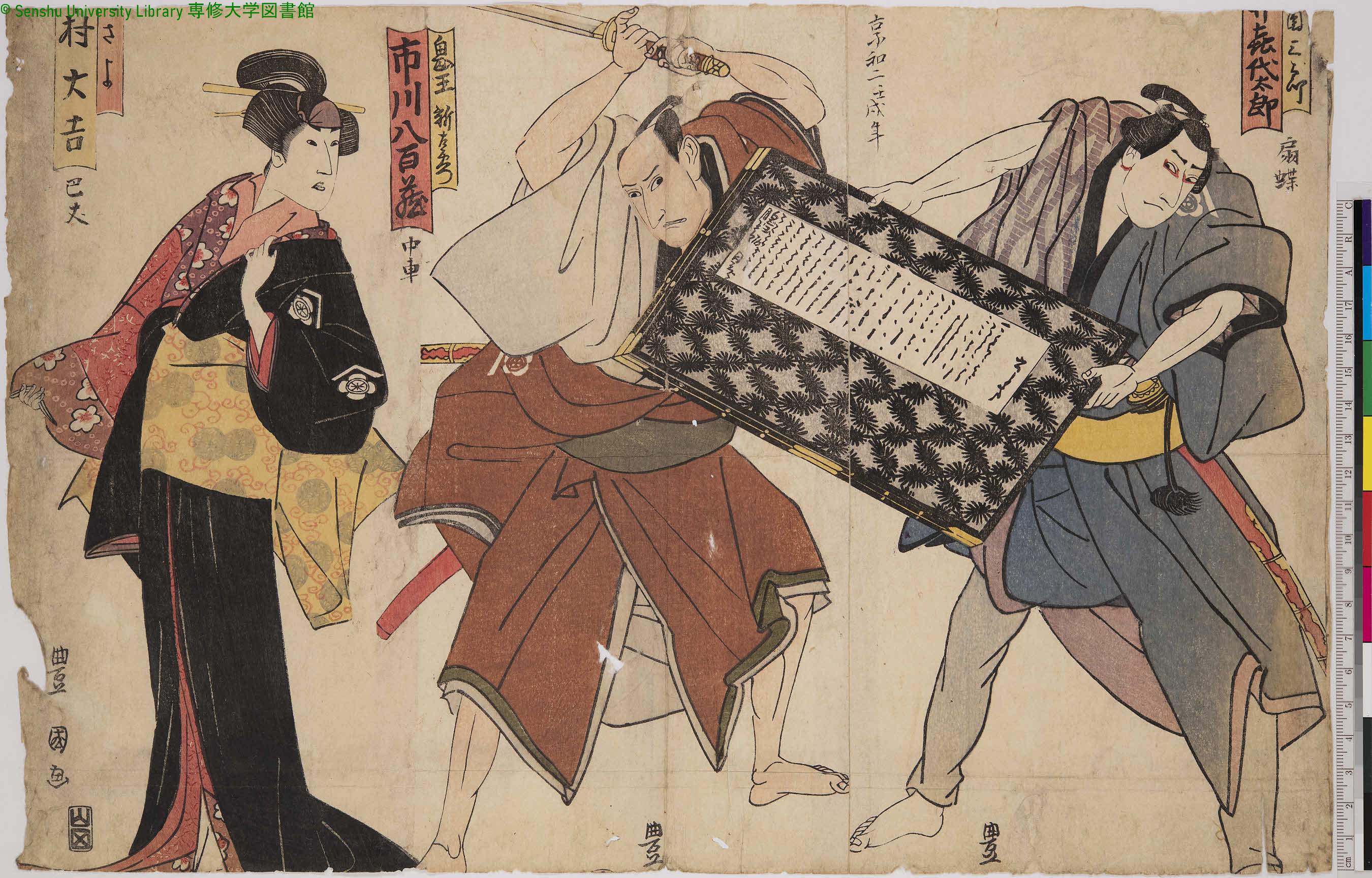-
The Art Research Center (ARC) to Exhibit at the BKC Well-being Campus Day 2023
Date: November 4 (Sat), 10:00-16:30
Venue: Ritsumeikan University Biwako Kusatsu Campus (BKC)
Entry is free of charge (advance reservation required).
→ Advance registration & details
The Art Research Center (ARC) is delighted to exhibit at the BKC Well-being Campus Day 2023, a day full of fun activities for both adults and children which attracted over 5,000 visitors last year.
In 2023, the ARC is marking the 25th anniversary of its establishment. In addition to exhibiting the results and achievements of 25 years of research activities, original ARC ukiyo-e merchandise will be available for purchase. Furthermore, we have prepared an Edo-period quiz for parents and children to enjoy. Those who answer all questions correctly will receive a gift.
We look forward to seeing you at the BKC Well-being Campus Day 2023.
The Art Research Center (ARC) to Exhibit at the Asia Week--A Festival of International Exchange
Date: October 22 (Sun), 10:00-16:00 (Between October 16 (Mon) and October 21 (Sat), mainly student-organized permanent exhibitions are held.)
Venue: Ritsumeikan University Osaka Ibaraki Campus (OIC)
Entry is free of charge (no reservation required).
→ For details, please refer to the event website
In 2023, the Art Research Center (ARC), Ritsumeikan University, is marking the 25th anniversary of its establishment. In addition to exhibiting the results and achievements of 25 years of research activities, original ARC ukiyo-e merchandise will be available for purchase. Furthermore, we have prepared an Edo-period quiz for parents and children to enjoy. Those who answer all questions correctly will receive a gift.
We look forward to seeing you at the Asia Week.
[イベント情報]September 7, 2023(Thu)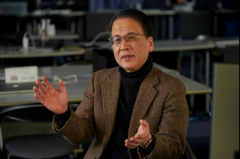 The Ritsumeikan University Game Archive Project (GAP) was launched by Prof. Koichi Hosoi, Deputy Director of the Art Research Center (ARC), when he was searching for a way to research games.
The Ritsumeikan University Game Archive Project (GAP) was launched by Prof. Koichi Hosoi, Deputy Director of the Art Research Center (ARC), when he was searching for a way to research games.The GAP--an industry-academia collaboration between Kyoto Prefecture, Nintendo, and Ritsumeikan University--aims to organize and digital-archive games and game-related materials to preserve game culture and establish a system for public use
A story on this project has been featured in English in Issue #18 of Ritsumeikan University's Research Report RADIANT.
[イベント情報]August 10, 2023(Thu)We are pleased to announce the Call for Manuscript Submissions for the Art Research Center's journal ART RESEARCH vol. 24-3.
As an academic journal specializing in arts and culture, the purpose of ART RESEARCH is to widely publicize the results of the research projects and activities conducted by the Art Research Center (ARC), Ritsumeikan University, and its partner institutions and collaborative researchers.
Since its establishment in 1998, the Art Research Center (ARC) has been selected for several national grants as a center of excellence for research in culture, art, and information science. In FY2019, the center assumed the role as the International Joint Digital Archiving Center for Japanese Art & Culture (ARC-iJAC) upon its accreditation by the MEXT as an International Joint Usage/Research Center. The ARC is highly regarded as a leading hub for the digital archiving of Japanese art and culture.
Our online journal will be published several times a year, and at the end of the fiscal year, a print booklet compiling all contributions will be distributed, as we hope to increase the submission opportunities for researchers.
We look forward to receiving your manuscript.
Read more>>[イベント情報]July 1, 2023(Sat)The Takeuchi Dokei Collection, held by the Kunitachi College of Music Library, is the world's largest collection of materials related to Edo-period Japanese music. The Art Research Center (ARC), Ritsumeikan University, is pleased to announce the online release of a number of ukiyo-e prints, banzuke theater programs, nagauta lyric booklets (shohon), and gidayu-bushi lyric booklets (shohon) from that collection.
At this time, 2,025 Tokiwazu-bushi lyric booklets (shohon) have been released. You can search for these by entering 常磐津 in the "genre" (ジャンル) search box at the following link:
https://www.dh-jac.net/db1/books/search_kunishohon.php?lang=en
Because Tokiwazu-bushi developed chiefly within the field of Edo kabuki, most of the Tokiwazu-bushi lyric booklets in the Takeuchi Dokei Collection were published in Edo. However, the collection also includes 196 items published in Nagoya.
A commentary on Tokiwazu-bushi lyric booklets by Takeuchi Yuichi (Research Institute for Japanese Traditional Music, Kyoto City University of Arts) can be found under「竹内道敬文庫の世界」→ 「C 資料解説」at the following link: https://www.arc.ritsumei.ac.jp/lib/vm/kunitake/2023/06/C3.html
[イベント情報]The Royal Ontario Museum (ROM) Collection of Ukiyo-e Prints and Japanese Old Books has been releasedJune 1, 2023(Thu)The Art Research Center (ARC), Ritsumeikan University, in collaboration with the Royal Ontario Museum (ROM), is pleased to announce that 4,233 ukiyo-e prints and 74 Japanese old books from ROM's collection are now available in our database.
・Royal Ontario Museum Ukiyo-e Database
*Note: From the ARC Ukiyo-e Portal Database, you can search for this collection by entering 'Royal Ontario Museum (ROM)' in the 'collection'-field.
・Royal Ontario Museum Japanese Old Books Database
*Note: From the ARC Early Japanese Books Portal Database, you can search for this collection by entering 'Royal Ontario Museum (ROM)' in the 'owner'-field.
Located in Toronto, Canada, the Royal Ontario Museum (ROM) showcases art, culture, and nature from around the world. Canada's largest, most-visited museum, ROM has the most extensive collection of Japanese art in the country, a large part of which are ukiyo-e.
Digital archiving of ROM's collection of ukiyo-e prints began in March 2020, at the start of the COVID-19 pandemic, with the digitization of all the ukiyo-e prints and some of the early Japanese books.
Since then, the ARC has continued to add to the database to ensure all the works from the collection are available online for the public. Each item in the ARC database is linked to ROM's online collection. (Some links are yet to be adjusted.)
The collection includes ukiyo-e prints from a wide range of periods and genres, from monochrome early ukiyo-e prints of the Genroku period (1688 - 1704), to shin-hanga prints of the Taisho and Showa periods.
At its core is the collection of over 2,000 ukiyo-e prints of Sir Byron Edmund Walker--one of the founders and first chairman of ROM--that was bequested to the Museum in 1926.
Regarding main genres, the collection consists of 1,426 landscape prints (名所絵), 685 prints of beautiful women (美人画), 464 warrior prints (武者絵), 375 actor prints (役者絵), and 361 prints of scenes from stories (物語絵; including duplicates of actor prints). It is also particularly noteworthy that there are 219 war prints (戦争絵), 83 earthquake (地震絵) and catfish prints (鯰絵), 33 prints depicting foreigners, and 201 surimono.
Regarding ukiyo-e artists, the collection includes 750 prints by Hiroshige, 716 prints by Gekko, 300 prints by Hokusai, 125 prints by Toyokuni I, 100 prints by Kunisada, and 117 prints by Utamaro.
In 2009, a donation of 136 warrior prints from the late James King, a professor of English at McMaster University, Hamilton, Ontario, enriched the collection of this genre. Moreover, Balfour Halévy, the former law librarian of York University, Toronto, donated his collection of over 600 works of Ogata Gekko to ROM in 2016. This rare collection is an essential source for research on Gekko.
We hope that access to this database from ROM's extensive collection provides a foundation for further ukiyo-e research and learning.
References:
・James King and Yuriko Iwakiri: Japanese Warrior Prints, 1646-1904. Hotei, 2007.
・Sir Byron Edmund Walker | Royal Ontario Museum (rom.on.ca): https://www.rom.on.ca/en/about-us/rom/founders/sir-byron-edmund-walker
[イベント情報]May 15, 2023(Mon)We are pleased to announce that 1,541 ukiyo-e prints held by the UC Berkeley Art Museum and Pacific Film Archive (BAMPFA) are now available on the website of the Art Research Center (ARC), Ritsumeikan University.
Ukiyo-e Database for Berkeley Art Museum and Pacific Film Archive
Note: From the ARC Ukiyo-e Portal Database, you can access this database by entering 'BAMPFA' in the 'collection'-field.
BAMPFA is the art museum of the University of California, Berkeley, in the heart of downtown Berkeley.
In September 2019, the Art Research Center (ARC) obtained authorization from the museum to digitize its collection of ukiyo-e prints, which has now been completed. Upon adding the metadata, we reported to the museum on the project in February 2020 and have been working to improve the data during the COVID-19 pandemic.
Coordinating with the museum, the ARC has made the database publicly accessible from the ARC website. A button for each item provides a direct link to the BAMPFA collection database.
Among the 1,541 ukiyo-e prints in the collection, 595 landscape prints (名所絵) make up the largest share, followed by 501 prints of beautiful women (美人画), 224 actor prints (役者絵), and 83 warrior prints (武者絵). Regarding ukiyo-e artists, the collection comprises 359 ukiyo-e prints by Hiroshige, 164 ukiyo-e prints by Kunisada I, 118 ukiyo-e prints by Hokusai, and 72 ukiyo-e prints by Kuniyoshi.
Particularly noteworthy are the 134 surimono (摺物) and 120 pillar prints (柱絵), for which the opening of this database provides a foundation for further research.
[イベント情報]May 1, 2023(Mon)We are pleased to announce that 1,481 ukiyo-e prints from the Mukai Nobuo Collection of Senshu University Library are now available online in the Ukiyo-e Portal Database of the Art Research Center (ARC), Ritsumeikan University.
Ukiyo-e Database of the Mukai Nobuo Collection, Senshu University Library
Note: From the ARC Ukiyo-e Portal Database, you can search for the Mukai Nobuo Collection by entering '向井信夫文庫' in the 'collection'-field.
The late Mukai Nobuo was known as a collector and researcher of Edo-period Japanese books. His collection comprises a wide variety of books from the late Edo period, such as gesaku (戯作)--including sharebon (洒落本), kokkeibon (滑稽本), hanashibon (咄本), and ninjobon (人情本)--kanshibun (漢詩文), kyoshi (狂詩) and kyobun (狂文), kosho zuihitsu (考証随筆), Yoshiwara-and kabuki-related works, picture books, and more.
While collecting these Japanese books, he also collected ukiyo-e prints and ukiyo-e albums of the same period. It is a well-balanced collection of late-Edo period actor prints (役者絵), warrior prints (武者絵), prints of beautiful women (美人画), and caricatures, with a sizeable collection of 690 works by Tsukioka Yoshitoshi (月岡芳年).
The Art Research Center (ARC) has collaborated in this project by digitizing the collection and providing detailed metadata.
While the Edo-period Japanese books of the Mukai Nobuo Collection are released sequentially by the National Institute of Japanese Literature, they are also accessible through the ARC database system.
Senshu University Library's Nobuo Mukai Collection Browsing System
Note: From the Early Japanese Books Portal Database, you can search by entering '専修大学' as the owner of the collection.
Regarding the use of rare books and materials of Senshu University Library, please refer to the library website https://library.lib.senshu-u.ac.jp/information/collection.
[イベント情報]April 20, 2023(Thu)We are pleased to announce the Call for Manuscript Submissions for the Art Research Center's journal ART RESEARCH vol. 24-2.
As an academic journal specializing in arts and culture, the purpose of ART RESEARCH is to widely publicize the results of the research projects and activities conducted by the Art Research Center (ARC), Ritsumeikan University, and its partner institutions and collaborative researchers.
Since its establishment in 1998, the Art Research Center (ARC) has been selected for several national grants as a center of excellence for research in culture, art, and information science. In FY2019, the center assumed the role as the International Joint Digital Archiving Center for Japanese Art & Culture (ARC-iJAC) upon its accreditation by the MEXT as an International Joint Usage/Research Center. The ARC is highly regarded as a leading hub for the digital archiving of Japanese art and culture.
Our online journal will be published several times a year, and at the end of the fiscal year, a print booklet compiling all contributions will be distributed, as we hope to increase the submission opportunities for researchers.
We look forward to receiving your manuscript.
Read more>>[イベント情報]April 17, 2023(Mon)立命館大学アート・リサーチセンターは、日本文化の有形・無形文化財のデジタル・アーカイブを研究テーマとし、文理連携による共同研究を推進してきました。2019年度には文部科学省 国際共同利用・共同研究拠点にも認定され、デジタル・アーカイブ構築を一層進める環境を提供しています。その環境を活用することにより、研究者が自らデジタル・アーカイブを構築しながら日本文化研究を精力的に進められる拠点となっています。アート・リサーチセンターは、学内向けにこの環境を提供し、研究成果を導くために活動を推進しています。
つきましては、以下のとおり研究拠点形成支援プログラム研究プロジェクトを募集します。研究拠点形成支援プログラム〔研究設備・資源活用型〕の公募要項・申請書はこちら
Read more>>


